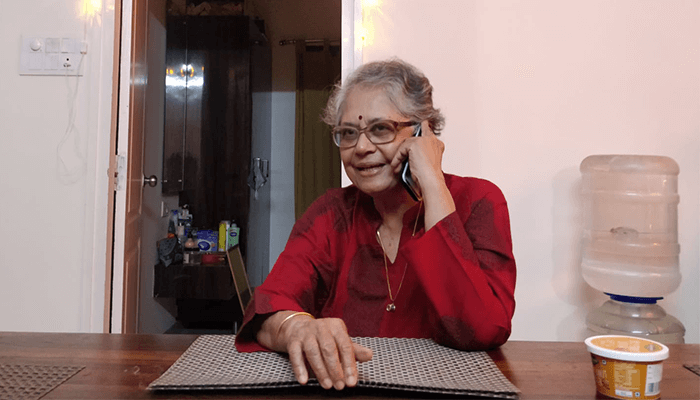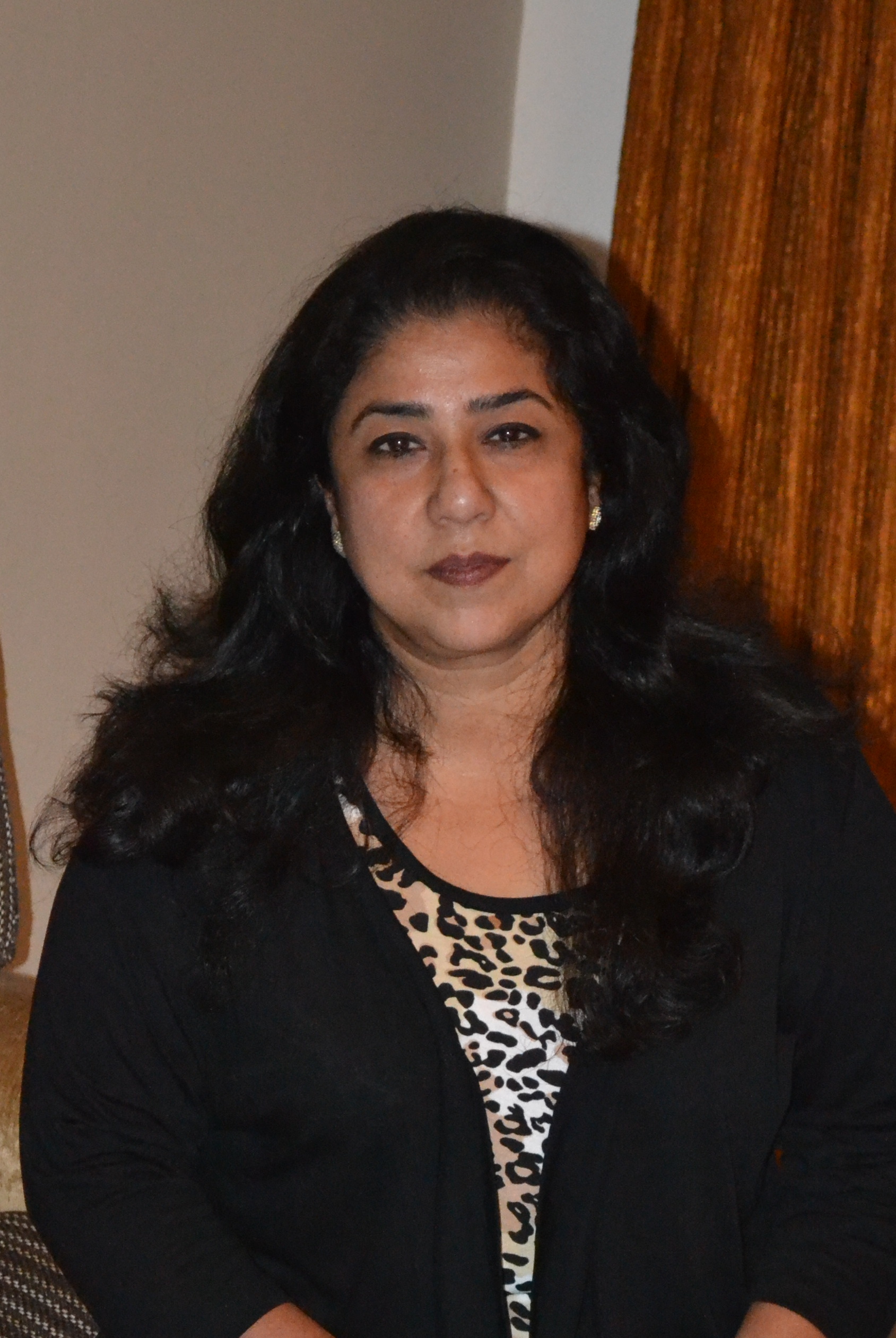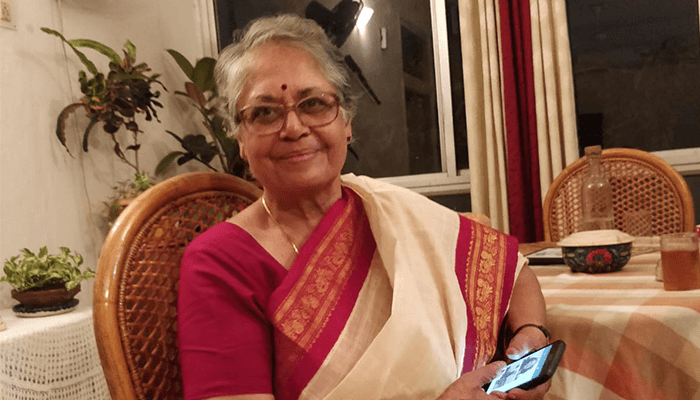Prof. Aditi Mukherjee, a sociolinguist, is teaching Linguistics to IT students about how language works. After a long career in pure humanities, she has reinvented herself and now takes a course in computational linguistics at IIITH’s LTRC lab. Here’s the story.
Prof. Aditi Mukherjee’s work on literacy and language maintenance and shift among displaced populations has earned her a formidable reputation in her field. The senior linguist retired as Dean of Arts Faculty, Osmania University and now teaches CS students at IIITH’s Language Technologies Research Centre. Her role in IIITH’s Anusaaraka project spotlighted the relevance of humanities in technology. Her academic interests are in Sociolinguistics, Applied Linguistics and Literacy studies. “I am not a prolific writer”, argues the professor, whose vast body of writing includes three books, four translated volumes and seven edited books. That’s a lot of ground covered for one who professes that “You have to beat me up to write something”.
The importance of being an earnest linguist
“In my career, I have worked on migrant populations and their language maintenance/shift”, explains the English lecturer turned sociolinguist. She studied the differential patterns of language maintenance/shift of the displaced Bengali and Punjabi population who had settled in Delhi after the partition of India in 1947. This was the theme of her PhD work that she began working on at the University of Illinois in USA. She completed her Ph.D work at Delhi University, during the unsettling Emergency era of the 1970s. In a similar study, she worked on the languages of the Bangladeshi (Sylheti) migrant population who had moved to Leeds in Yorkshire, during her stint at the University of York.
Charting the trajectory from Literature to computational linguistics
Post-Partition, Prof. Mukherjee’s parents arrived in New Delhi as migrants from Bangladesh. They had the typical migrant insecurity about their children losing their cultural capital and as a result, ensured that they read a lot of Bengali literature. Living in Delhi, she was submerged in a variety of literature in Bangla, Hindi and English that transcended the language barrier. Little wonder that all her siblings are eminent academics.
Prof. Aditi Mukherjee got her master’s degree in English literature and PG diploma, M.Litt. and PhD degrees in linguistics from Delhi University. The Fulbright Scholar from the University of Illinois would spend a year in Urbana/Champaign doing courses that sharpened her tools. “I had carried some data with me and thus had extensive discussions with the linguists there. The university has one of the five biggest libraries in the USA, with a huge collection of material on Indian literature and languages”, she recalls.
Prof. Mukherjee began her teaching career as an English Lecturer in Lakshmi Bai College, New Delhi. Thirteen years later, she realized that she needed to work in a more challenging and relevant domain. She ventured in to linguistics. She joined Osmania University as a Reader in the Department of Linguistics in 1982. She held many academic and administrative positions in the University; as HoD for two terms, Board of Studies Chairperson and Coordinator, CAS and ASIHSS programs. When she retired as the Dean, Faculty of Arts, in 2008 the department came together to publish a special volume of Osmania Papers in Linguistics in her honor.
For the seminars and conferences that were organized during her tenure, “my role was to get the best minds together in that particular field and make sure that good quality papers came to that particular workshop/seminar/conference”, says the cheerful sociolinguist. In most of the ventures, “What one was trying to do was not just theory, but to connect with life”.
In 1986, she received the Nuffield Fellowship from the University of York to work on the migrant Bangladeshi population. It was a very interesting experience because the diaspora initially refused to open up to her since she was perceived as part of the government’s scheme to detect illegal immigrants. “It took a long time to break that ice, but finally the experience was highly rewarding”, she observes.
The Fellowship given by the Indian Institute of Advanced Study, Shimla during 1997-1999 was a reprieve from the routine mundane teaching. “I worked on the question of literacy and submitted a monograph which was published. IIAS has an excellent library and there were scholars like Krishna Sobti and Bhisham Sahni that you were interacting with, who were shaping your thought in a big way”, she reflects.

Anusaaraka and other pursuits
After retirement, Prof. Mukherjee joined Anusaaraka, a project on Machine aided translation at IIITH in 2008. “At that time, we were trying to do word sense disambiguation among other things in the project. We were writing rules and defining the context for the machine to understand and identify the correct sense of a word in a given context. Honestly, it took me a while to get the hang of what was happening but it was extremely interesting. I worked with Prof. Vineet Chaitanya, who is actually the heart and soul of this project. He’s an extraordinary scholar but catching up with what he was trying to do was a bit tough in the beginning”, confesses the professor.
Prof. Mukherjee has taught courses in sociolinguistics and research methodology at several leading institutions like the Center for Applied Linguistics and translation Studies at the University of Hyderabad and Potti Sriramulu Telugu University and a short course on Bengali language at the University of Zagreb.
Along with her academic pursuits, the professor was also translating books in Hindi, English and Bengali. In 2010, she moved to Mysore as the first Director of the National Translation Mission, a flagship venture of the MHRD. Sometime in 2013, she returned to IIITH. She teaches courses at LTRC along with working on the post editing part of projects in machine translation. “We need translation in a big way because there is a lot of information available in English, a language that the majority of the Indian population does not know. Thus breaking these language barriers becomes vital”, believes the professor.
The IIIT Hyderabad experience
“There is a lot of positive energy here in IIIT which is highly conducive for an academic life. I breathe fresh air and freedom. At the end of my academic career, it’s a real reward to have that kind of feeling”, she muses philosophically.
“There are tough decisions you have to take in life and one had to prioritize”, explains Prof. Mukherjee on the subject of work-life balance. “There was a point when I had to let go of better opportunities because that entailed disrupting my daughter’s education among other things in the family. To the extent that you don’t topple the applecart, a compromise is perfectly all right.”
Prof. Mukherjee unwinds by reading and cooking, that is like an occupational therapy for her. Reading literature, she believes, shapes you as a human being. It is a bit disturbing that many of us are now alienated from this vital resource.
“I am currently translating one of Manik Bandopadhyay’s works, a famous Bengali literary figure, who died unsung, in penury. He told the kind of stories that even today, after 70-80 years, are extremely relevant”, observes Prof. Mukherjee. The professor, as part of a team, is currently trying to translate a part of Hegel’s Philosophy of Spirit/Mind. She admits it is a daunting, if not an impossible, task. And, there lies the challenge.
“I see myself as a rolling stone! It is said that a rolling stone gathers no moss. To this day I have not discovered the ‘virtue’ of moss”, she ends with a smile.



Congrats! Impressed by your versatility.
Savita Sahni nee Saini says: